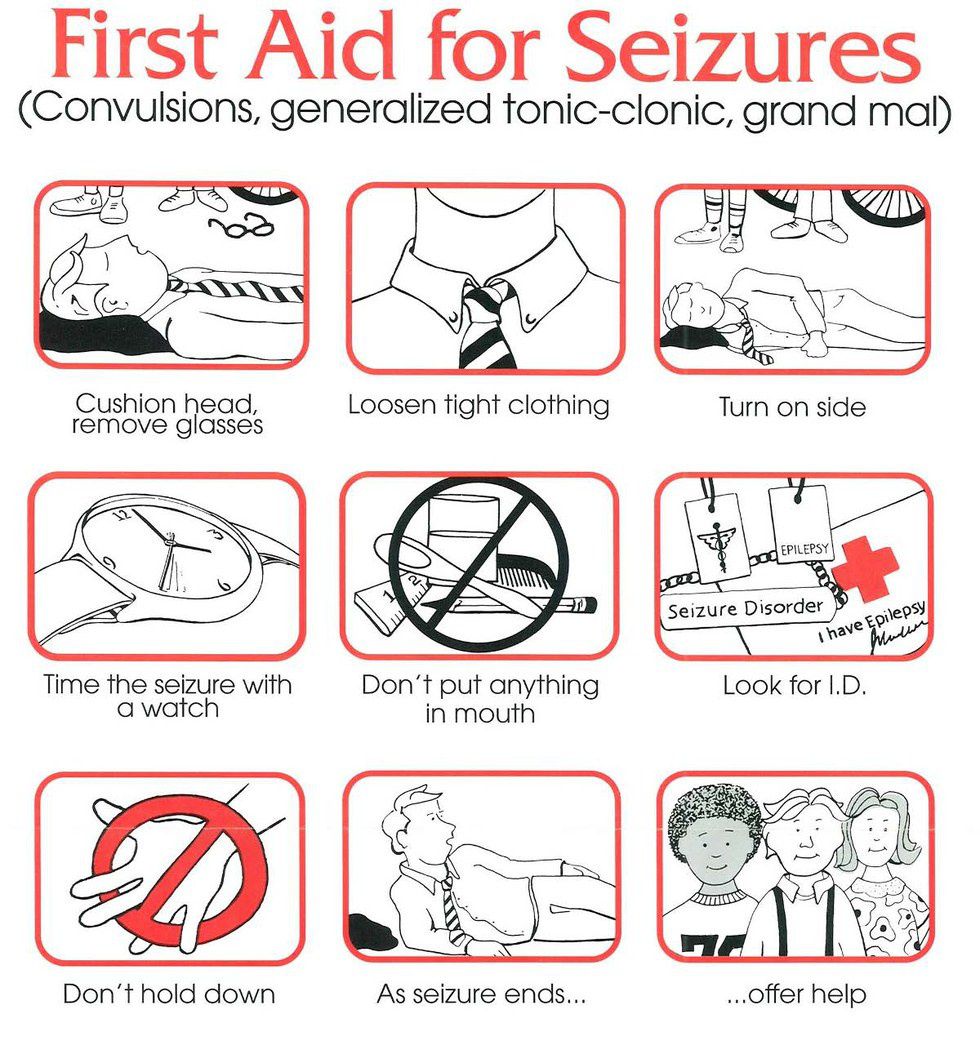"You look like you're having a seizure!"
When I hear someone jokingly use this simile, I hear Inigo Montoya's voice in my mind:
I understand that they are trying to be funny, but having a seizure is not something to joke about. In fact, if your friend really is having a seizure, I can guarantee that you would be freaking out and peeing your pants rather than ignorantly laughing at your friend who is spazzing out because a bug landed on their head. I know this because I grew up with a best friend who has epilepsy. I've only seen her have a seizure once (and once is enough for me), but I remember when we were younger how her mom would prep me every time we hung out just in case she had a seizure while we were together. She was preparing me and others so that we wouldn't be freaked out and so that we would know how to keep her from hurting herself if her brain temporarily took her from being with us. I had to learn at a young age of the scary reality of epilepsy, but it doesn't even compare to the terror for those who live with it. How I learned to stop making seizure jokes was by being educated about it and knowing someone who is an epileptic. Whether you know someone or not who has epilepsy, these are things EVERYONE should know about epilepsy.
1. Epilepsy is a brain disorder that causes stress, which is basically like electric storms in your brain.
2. Not everyone with epilepsy has convulsive, jerking seizures.
A person who has a seizure can experience a variety of different seizures. Most people have what is called "partial" seizures where the brain is only affected in one area and can result in a physiological reaction, motor, or sensory changes. The person will either be staring blankly and/or smack their lips, pluck at their clothing, wander around, or react in abnormal, involuntary actions.
The dramatic convulsions are a result of a seizure affecting both sides of the brain at once. These seizures can result staring spells, body jerking and falling to the ground.
3. When someone's having a convulsive seizure, keep them safe, supported and on their side.
4. Never force something into their mouth.
If person having a convulsive seizure stops breathing and their skin turns blue, do not try to help them breathe with CPR, and do not hold their tongue to keep them from "swallowing their tongue." The reason this is happening is because their diaphragm and/or lungs are becoming stiff. This is brief and will be over shortly. The best thing to do to help them is by positioning the person on their side with their mouth pointed downward.
The one time I witnessed my best friend have a seizure was on the indoor soccer field in junior high. At first it didn't look odd; it just looked like she was looking for a fly buzzing around her face, but then her body fell to the ground and her mom came storming onto the soccer field. Her mom held her body on the side to keep from banging her head on the ground as someone else called 911.
5. Remain with the person after they have a seizure to calm them.
When they come out of it, they will be confused and not remember what happened. To this day, my best friend doesn't remember that she had a seizure while we were playing soccer 10 years ago.
Help the person not be humiliated by covering up any body liquids that may have been released while they were not in control or aware of their bodies. Reassure and comfort them that they are OK and let them know what just happened.
6. Seizures are scary, so be prepared before one happens.
It's super terrifying to see a seizure, but it's so important to be prepared to act whenever a seizure does happen. When my best friend had a seizure on the soccer field, her mom yelled at her to sit down on the ground before she fell. Even though she lost control of her body temporarily, she was still able to hear her surroundings. If her mom, or anyone who knew what to do, wasn't there to talk to my best friend, she could have gotten hurt.
7. Seizures aren't just caused by flashing lights.
Seizures are commonly triggered by stress or being overtired. Other common triggers for seizures include: specific times of day or night, sleep deprivation, stress, illness, flashing bright lights or patterns, caffeine, alcohol or drug use, menstrual cycles or other hormonal changes, poor diet and certain medications.
**Not every epileptic person will have the same triggers.
8. Seizures can happen to anyone.
It is possible to have a seizure without being diagnosed with epilepsy. A diagnosis usually comes when someone has two unprovoked seizures (meaning it wasn't caused by an injury, infection, drug or alcohol withdrawal, or other health condition.)
For example, I am not an epileptic like my best friend. But two years ago, I pulled my first all-nighter to finish a big project for a class. I hadn't slept for two days and I was under a huge amount of stress and anxiety outside of school. The day my project was due, I had stayed up all night with no rest, and my body felt fine after the sunrise. So I continued working and got ready to go to class that afternoon. I was tired, but my brain had trouble functioning as I walked around campus. When my 2 p.m. class started, I sat on the back row with my finished project that I've been wearing myself out to finish. However, even though my body was in class, I didn't feel like I was there. I was so overtired that my brain was starting to shut down, but it was working overtime to keep my body functioning. My eyes couldn't stay open and my hands were beginning to shake even though they were laying on the desk. I heard my professor and the other students talking, but I couldn't respond in any way.
Thankfully, we were released early (because the professor decided to give us more time on our projects... great, I lost sleep for nothing). I don't remember how I got to my apartment, but somehow I safely walked down the hill and up the three flights of stairs of my apartment building, and I collapsed in my bed. I slept for almost three hours. When I woke up, my brain and body were back to normal, but I had trouble remembering how I got to my bed. In fact, looking back on this memory I can't describe to you the details of that day. I didn't even consider that I was possibly experiencing a minor seizure that day. Regardless of what it was, I've never done an all-nighter again. Even if I procrastinate on projects, it's not worth destroying my body over. Lesson learned to not procrastinate!
Whether you're an epileptic or not, seizures are a real and they can happen. Some medication works and others don't. The most important thing to learn is how to respond whenever a seizure occurs and how to prevent seizures. If you or a loved one has two or more seizures in a year, then go to the doctor to get diagnosed and find medicine that helps. But if you're not a epileptic and you've experienced a convulsive seizure or a minor one, think back what you were doing before that seizure and how you can take better care of yourself.
Did you get enough sleep?
Did you eat enough?
What did you eat? (Are you only eating junk food and fast food?)
Did you get exercise or do anything that helps you relax?
Are you over-stressed or over-worked?
If anything a seizure is something that alerts our brain that something is wrong. Epilepsy does not keep you from living your life, but an epileptic is more aware of the importance of taking care of themselves. That is something that everyone should be conscious of.
"Epilepsy gave her an adversity to fight against. It had shaped her personality, the need to be careful and secretive, and the ability to see things a bit differently from the neurotypical. She granted that this feeling of having a broken brain that required her to be sensitive to always look" above to survive. (Thomm Quackenbush, Flies to Wanton Boys)








































